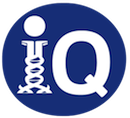iQ Biosciences is one of the few providers of X-ray-based irradiation of human and animal cells in the San Francisco Bay Area, offering:
- Simple online quote request forms with quick response time
- Customer-determined dosage
- Flexible scheduling based on availability and usage
- Easy drop-off and pick-up
- Customization for more complex requests, including cell line expansion and cryopreservation
Service Overview
Cell Irradiation
Cell irradiation is the process of subjecting cells to radiation of certain dosages. To accomplish this, an instrument called an irradiator is used to expose cells to radiation, which can be x-ray or radioactivity based/generated. The cells are subjected to a certain dosage of radiation as measured by rads or grays in order to affect cellular functions. Depending on the dose, some biological functions are affected while others are not. For example, cell irradiation can lead to the arrest of proliferation but leave antigen presentation on MHC molecules intact.
Irradiation Service at iQ Biosciences
iQ Biosciences has the CellRad X-Ray Irradiation System on-site and is excited to provide X-Ray-based irradiation as a service to our customers. To obtain a quote for this service, select from the applicable option below, or explore the array of irradiated cell products we currently offer:
Select from one of the convenient options below:
Application Summary for Irradiated cells
Both irradiated human and animal PBMCs are commonly used as antigen presenting cells, stimulation/feeder cells, or target cells in a wide variety of immunology-based applications. At a certain dose, these cells will not divide or respond to stimulus. However, the antigen presenting cells found in the peripheral blood, such as dendritic cells, macrophages, and B cells, can still present antigenic peptide to stimulate CD4 and CD8 T cells. In these types of co-culture studies that require antigen presentation, peptide is added to the irradiated PBMCs, which then present the peptide to activate T cells in order to produce cytokines, proliferate, and perform cytotoxicity.
Irradiated PBMCs can also be used as stimulator cells in mixed lymphocyte reactions (MLR). In these type of experiments, the irradiated cells and exogenously added effector cells, which are typically T cells, are of different genetic backgrounds. In particular, they are of different MHC haplotypes. The effector cells will respond to the difference in the MHC haplotype and begin to produce cytokines, proliferate, and perform cytotoxicity.
Cell lines are also irradiated in order to act as targets for cytotoxicity studies or stimulator/feeder cells to propagate primary cells. For example, the K562 cell line can be irradiated and used as targets in cytotoxicity experiments with human NK cells. Furthermore, irradiated K562 cells are often used to expand NK cells for research and clinical purposes.
Recently, it has been shown that some immune checkpoint proteins bind ligands that are only expressed after exposure to radiation. Therefore, irradiated target cell lines which have exposed ligands are used to identify compounds that may interfere with the binding of the ligand to its cognate checkpoint protein.
In addition, irradiated cells are also frequently used in apoptosis and vascular growth research. Certain dosages will promote apoptosis while others will inhibit endothelial cell growth, which permits investigators to study these functions.
Irradiated Primary Cell Products
iQ Biosciences also offers the following irradiated primary cell products for direct purchase:
